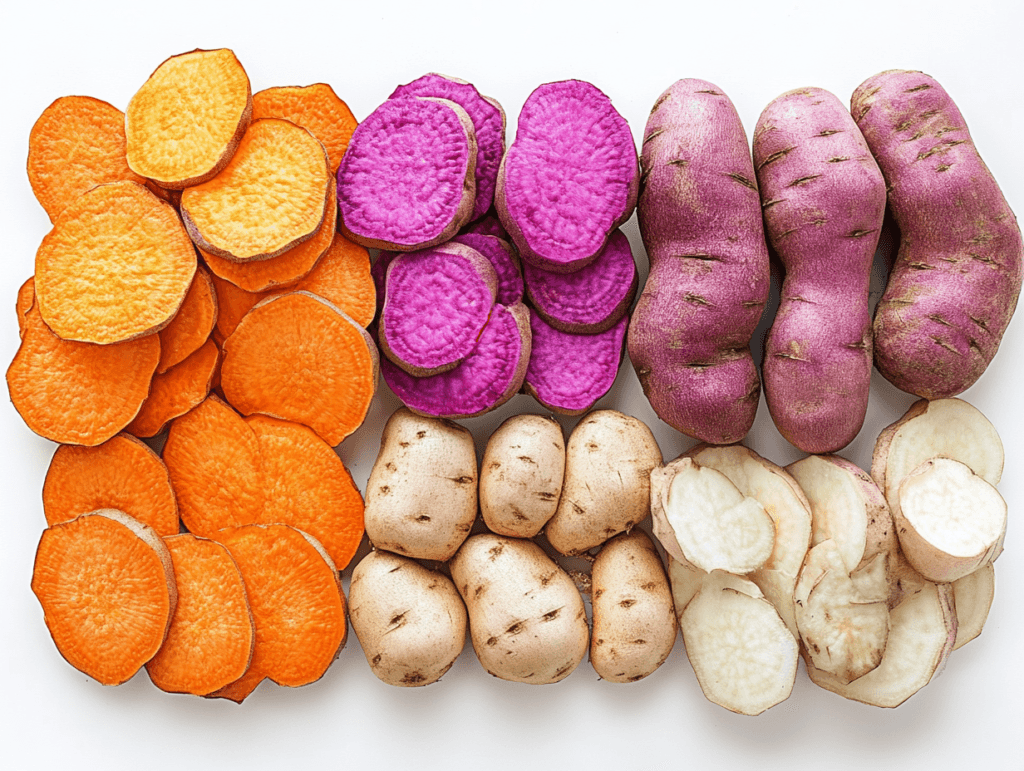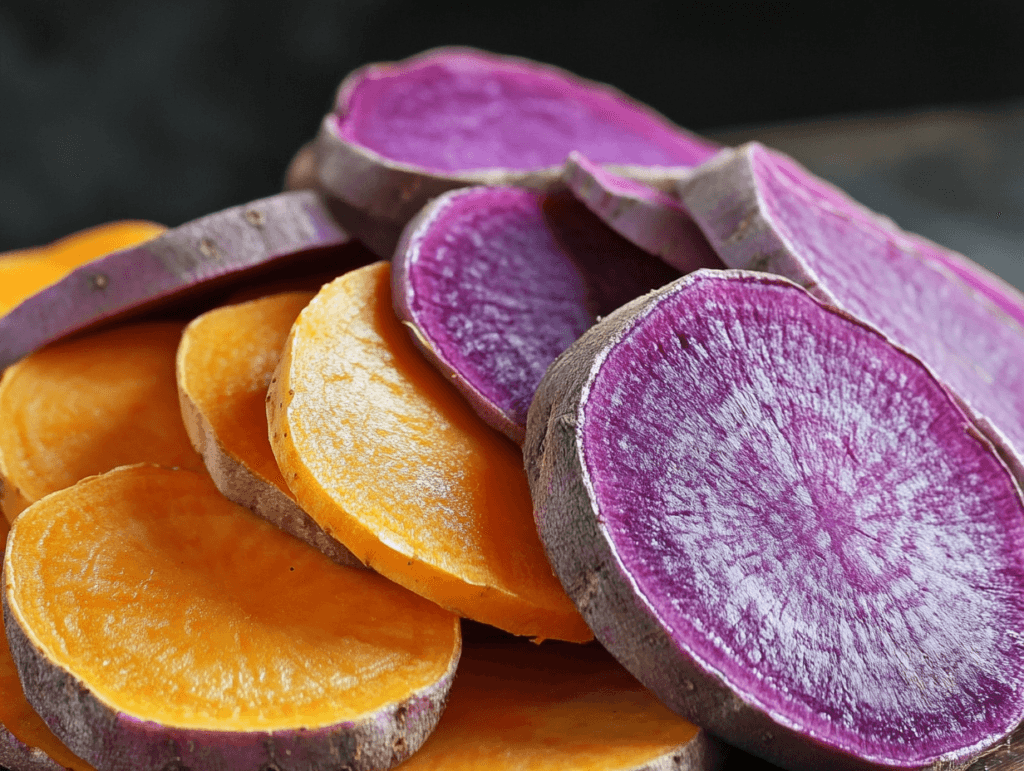Sweet potatoes are a healthy and versatile food, but Which Sweet Potato Is Healthiest With options like orange, purple, white, and Japanese sweet potatoes, it can be hard to pick the best one for your needs. In this article, we’ll look at the nutritional differences between these types, their health benefits, and how cooking affects their value. Whether you want to boost your immune system, manage blood sugar, or improve digestion, there’s a sweet potato variety that’s right for you.
Table of Contents
Nutritional Profile of the Sweet Potato

Sweet potatoes are packed with nutrients, including important vitamins, minerals, and antioxidants. They are low in fat and calories but provide plenty of healthy carbohydrates, making them a great source of energy. Their high fiber content helps with digestion and supports a healthy gut. Some types of sweet potatoes also contain special plant compounds that add to their health benefits.
Nutritional Profile of Sweet Potatoes
Overview of Macronutrients
Sweet potatoes are mainly made up of complex carbohydrates, which provide long-lasting energy. A medium-sized sweet potato typically contains:
- Calories: 100–120
- Carbohydrates: 24–27 grams
- Fiber: 3–4 grams
- Protein: 2–2.5 grams
- Fat: Less than 1 gram
The fiber content aids in digestion and promotes a feeling of fullness, making sweet potatoes an excellent choice for those seeking weight management.
Vitamins and Minerals in Sweet Potatoes
Sweet potatoes are nutritional powerhouses filled with:
- Vitamin A : Important for healthy eyes and a strong immune system, especially found in orange sweet potatoes.
- Vitamin C: Helps make collagen, strengthens immunity, and works as an antioxidant.
- Potassium: Helps muscles work properly and supports healthy blood pressure.
- Manganese: Supports metabolism and keeps bones strong.
Other notable nutrients include magnesium, copper, and small amounts of calcium and iron.
Antioxidants and Phytochemicals
Different varieties of sweet potatoes are rich in unique antioxidants and phytochemicals:
- Beta-carotene: Found in orange-fleshed sweet potatoes, converted to vitamin A in the body.
- Anthocyanins: Found in purple sweet potatoes, known for their powerful anti-inflammatory and antioxidant properties.
- Chlorogenic acid: Present in white and Japanese sweet potatoes, supporting blood sugar regulation.
Comparing Varieties of Sweet Potato
Orange-Fleshed Sweet Potatoes: Are They the Healthiest Sweet Potatoes?
When asking which sweet potato is healthiest, orange-fleshed sweet potatoes often come to mind due to their high beta-carotene content. This nutrient is essential for vision and immune support. Slightly sweeter and softer when cooked, they are ideal for baking or mashing, making them a popular choice for health-conscious individuals.
White-Fleshed Sweet Potatoes
When deciding which sweet potato is healthiest, white-fleshed sweet potatoes are a top choice for helping manage blood sugar. They have a mild flavor and are less sweet than orange varieties. If you’re curious about how other varieties compare, learn more in our article on Do Purple Sweet Potatoes Taste Different?. Additionally, white sweet potatoes’ high chlorogenic acid content can help keep blood sugar levels steady, making them a good option for people with diabetes or those on low-glycemic diets.
Purple Sweet Potatoes: A Contender for the Healthiest Sweet Potatoes
Purple sweet potatoes are rich in anthocyanins, the compounds that give them their striking color. These antioxidants support cardiovascular health and reduce inflammation. Purple sweet potatoes are slightly denser and less sweet, making them ideal for roasting.
Japanese Sweet Potatoes
Japanese sweet potatoes also rank high when considering which sweet potato is healthiest. Known for their dry texture and nutty flavor, they offer a balance of carbohydrates and antioxidants. These nutrients support improved digestion and energy, making Japanese sweet potatoes a favorite in both traditional and modern dishes.
Health Benefits by Variety of Sweet Potato

Sweet potatoes come in a variety of colors, each offering distinct health benefits based on their unique nutrient profiles.
Immune System Support (Orange Varieties)
Orange-fleshed sweet potatoes are an excellent source of beta-carotene, a precursor to vitamin A. Consuming foods rich in beta-carotene:
- Boosts the immune system by increasing white blood cell production.
- Encourages healthy skin and mucous membranes, acting as a defense against infections.
- Enhances eye health and helps prevent issues such as night blindness.
Gut Health and Inflammation Reduction (Purple Varieties)
Purple sweet potatoes contain anthocyanins, powerful antioxidants that reduce inflammation in the gut and body. Benefits include:
- Supports a healthy gut: Acts as a prebiotic, providing food for good bacteria in the gut.
- Shields cells: Minimizes oxidative stress, decreasing the likelihood of chronic illnesses.
- Enhances blood flow: Promotes vascular health by reducing artery stiffness and improving circulation.
Blood Sugar Regulation (White Varieties)
White-fleshed sweet potatoes have a lower glycemic index than other types. Their chlorogenic acid content can contribute to:
- Slow down the release of glucose into the bloodstream, preventing spikes in blood sugar.
- Improve insulin sensitivity, making them a better choice for people with diabetes or those following low-glycemic diets.
Anti-Inflammatory and Energy-Boosting (Japanese Varieties)
Japanese sweet potatoes are packed with nutrients and help provide long-lasting energy. Their anti-inflammatory properties, derived from antioxidants like vitamin C and manganese, help:
- Reduce the risk of inflammatory conditions like arthritis.
- Deliver sustained energy, making them ideal for athletes or those with high physical activity levels.
Which Sweet Potato Is Best for Specific Diets?
Sweet potatoes can adapt to a variety of dietary preferences thanks to their unique nutritional profiles.
Weight Loss and Low-Calorie Diets with the Healthiest Sweet Potatoes. For individuals focused on weight management, sweet potatoes are a great option because of their:
- High fiber content, which helps you feel full and prevents overeating.
- Low-calorie profile, particularly when steamed or baked without extra fats.
Best Choice: Orange and purple varieties are ideal, as they offer more fiber and fewer calories.
Diabetic and Low-Glycemic Diets with the Healthiest Sweet Potatoes
White sweet potatoes are a suitable choice for individuals monitoring their blood sugar levels due to their:
- Lower glycemic index compared to orange or Japanese varieties.
- High chlorogenic acid levels that moderate glucose absorption.
White sweet potatoes are a great option for those looking to regulate blood sugar levels due to their:
Athletic Performance and High-Carb Needs
For athletes or those with high energy requirements, Japanese and orange sweet potatoes are excellent due to their:
- High carbohydrate content, which replenishes glycogen stores post-exercise.
- Rich vitamin A and potassium levels, supporting muscle recovery and hydration.
Athletes often prefer baked sweet potatoes for a portable, nutrient-dense snack.
How Cooking Methods Impact Sweet Potato Nutrition
The way you prepare sweet potatoes can significantly impact their nutritional value and overall health benefits. Sweet potatoes are inherently nutrient-dense, but the cooking method you choose can either preserve or diminish specific nutrients, as well as affect their bioavailability—the body’s ability to absorb and use these nutrients effectively. For example, steaming or boiling tends to retain more vitamins, making them ideal for creating the healthiest sweet potato dishes. On the other hand, frying may increase calorie content but reduce certain antioxidants. Understanding how different preparation methods influence the nutritional profile of sweet potatoes helps you enjoy the healthiest sweet potato options while maximizing their benefits and savoring their natural flavors.
Boiling vs. Baking
- Boiling:
Boiling sweet potatoes retains more of their beta-carotene compared to baking or frying. The water-soluble vitamins (like vitamin C) are partially lost, but the glycemic index is lower, making boiled sweet potatoes an excellent option for diabetics.- Best for: Retaining beta-carotene and achieving a low-glycemic index.
- Baking:
Baking enhances the natural sweetness of sweet potatoes by caramelizing their natural sugars. However, this method may reduce water-soluble vitamin content like vitamin C. Baking also has a higher glycemic index than boiling but preserves antioxidants like anthocyanins in purple varieties.- Best for: Enhancing flavor and preserving antioxidants.
Frying vs. Steaming
- Frying:
While frying can add flavor, it also increases calorie and fat content significantly, diminishing the overall health benefits of sweet potatoes. Prolonged frying can also reduce antioxidant levels.- Best for: Occasional indulgence with added seasonings for taste.
- Steaming:
Steaming is a gentle cooking method that retains most nutrients, including vitamins and antioxidants. It prevents excessive loss of nutrients into the water, as seen in boiling.- Best for: Retaining nutrients while preserving the natural texture and flavor.
Impact of Preparation (Skin On vs. Skin Off)
The skin of a sweet potato is packed with fiber, antioxidants, and nutrients like potassium and magnesium. Removing the skin reduces the fiber content and eliminates some vitamins and minerals.
- With skin: Maximizes fiber and nutrient content, supporting gut health and aiding digestion.
- Without skin: May be preferred for smoother textures in soups or purees but loses some nutritional value.
Microwaving Sweet Potatoes
Microwaving is a quick and convenient way to cook sweet potatoes while retaining most of their nutrients. This method minimizes exposure to water and heat, preserving vitamins like vitamin C and antioxidants.
- Best for: Retaining nutrients with minimal time investment.
Tips for Optimal Sweet Potato Preparation
To maximize health benefits while enjoying their natural flavors, consider these tips:
- Combine cooking methods (e.g., steaming followed by roasting) to balance taste and nutrition.
- Add healthy fats like olive oil to enhance the absorption of fat-soluble nutrients like beta-carotene.
- Sprinkle spices like cinnamon or turmeric to boost anti-inflammatory properties without added calories.
Discover the unique taste of purple sweet potatoes.
Frequently Asked Questions

Are sweet potatoes healthier than regular potatoes?
Yes, sweet potatoes are generally considered healthier than regular potatoes, but which sweet potato is healthiest among the many varieties available? Sweet potatoes, in general, provide higher levels of nutrients like beta-carotene, vitamin C, and fiber compared to regular potatoes. While both are nutritious, sweet potatoes have the added advantage of a lower glycemic index, making them a better option for managing blood sugar. Additionally, their rich antioxidant content helps reduce inflammation and combat oxidative stress, offering more health benefits overall. Understanding which sweet potato is healthiest can help you make more informed dietary choices.
Which variety of sweet potato is best for weight loss?
Orange and purple sweet potatoes are excellent for weight loss due to their high fiber content, which promotes satiety. Additionally, these varieties are relatively low in calories and have a mild natural sweetness, reducing the need for added sugar or high-calorie toppings.
Are purple sweet potatoes healthier than orange ones?
Purple sweet potatoes contain higher levels of anthocyanins, powerful antioxidants that combat inflammation and oxidative stress. However, orange sweet potatoes excel in beta-carotene, crucial for eye health and immune support. The healthiest choice depends on your specific health goals. Ideally, include both varieties in your diet to maximize benefits.
Can people with diabetes eat sweet potatoes?
Yes, people with diabetes can safely consume sweet potatoes, especially white-fleshed and purple varieties, which have a lower glycemic index. To minimize blood sugar spikes, pair sweet potatoes with protein-rich or high-fiber foods and choose cooking methods like boiling or steaming over frying.
Do sweet potatoes lose nutrients when cooked?
Cooking sweet potatoes can cause some nutrient loss, especially of water-soluble vitamins like vitamin C. However, methods like steaming or microwaving minimize this loss. Boiling retains more beta-carotene, while baking preserves antioxidants. Opt for gentler cooking methods to retain the most nutrients.
How do I store sweet potatoes for maximum freshness?
Store sweet potatoes in a cool, dark, and dry place, like a pantry or basement. Avoid refrigeration, as cold temperatures can alter their taste and texture. Properly stored, sweet potatoes can last up to 2–3 weeks.
Additional Questions
- Can you eat the skin of sweet potatoes? Yes, you can eat the skin of sweet potatoes, and it’s a nutritious choice! When asking which sweet potato is healthiest, it’s important to consider that the skin contains fiber, potassium, and antioxidants that enhance overall health. Leaving the skin on during preparation not only maximizes nutrition but also supports digestive health and adds texture to meals like roasted or baked sweet potatoes.
- How many sweet potatoes should I eat per day? Eating one medium-sized sweet potato per day is a practical way to include essential nutrients like vitamin A and dietary fiber in your diet. But if you’re wondering which sweet potato is healthiest, remember that variety matters! Incorporating different types of sweet potatoes ensures you benefit from their unique nutrient profiles.
- Are sweet potatoes suitable for keto diets? Sweet potatoes are not typically keto-friendly due to their high carbohydrate content.
Conclusion
Sweet potatoes are not only delicious but also a powerhouse of nutrients, offering a wide range of health benefits tailored to different dietary needs and preferences. Whether you prefer the vibrant orange-fleshed sweet potatoes for their immune-boosting beta-carotene, the rich purple varieties for their inflammation-fighting anthocyanins, or the milder white sweet potatoes for blood sugar regulation, each type brings its unique advantages to the table.
When selecting the healthiest sweet potato, consider your personal health goals:
- For improved immunity and eye health, choose orange-fleshed sweet potatoes.
- For enhanced gut health and antioxidant protection, go with purple sweet potatoes.
- For blood sugar control, white-fleshed sweet potatoes are ideal.
- For energy and athletic recovery, Japanese sweet potatoes are an excellent choice.
Tips for Maximizing Health Benefits :
- Variety Matters: Incorporate different types of sweet potatoes into your meals to enjoy the full spectrum of nutrients they offer.
- Mind the Cooking Method: Opt for steaming, boiling, or microwaving to retain the most nutrients, and limit frying to special occasions.
- Eat the Skin: Whenever possible, leave the skin on to maximize fiber and antioxidant intake.
Sweet potatoes are a versatile food that can adapt to countless recipes, from savory dishes like roasted sweet potato wedges to sweet options like baked desserts. For a creative twist, try this delicious Purple Sweet Potato Recipe, which showcases their vibrant color and unique flavor. No matter how you prepare them, they remain an excellent choice for maintaining a balanced and nutritious diet.

